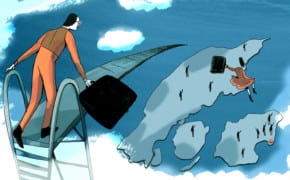Universitetsavisen
Nørregade 10
1165 København K
Tlf: 35 32 28 98 (mon-thurs)
E-mail: uni-avis@adm.ku.dk
Section
A new prorector position is to help the University of Copenhagen identify and hire the best international scientists, both for research and management positions, says professor and board member Jesper Grodal. He calls it a key position at the university.

As the pandemic lays waste to large parts of university life, the aquariums are still humming at the Natural History Museum of Denmark. PhD student Anna Olesen keeps the algae collection alive - and almost scared the life out of a security guard.

Professor Ole Wæver's theory of securitization has been accused of being so racist that it should never be applied again. But the criticism is bad science, Wæver responds. He says he is caught in a catch-22 situation where it is hard to defend himself.

Scientists can most likely return to their labs in June, and study programmes will most likely reopen in August.

Few people had heard of the virologist Allan Randrup Thomsen in February, but since March he has become one of the most cited researchers in the Danish media. This puts him in a vulnerable position, especially because he talks out about a virus that no one really knows.

Following a partner to a new country as a spouse is tough. Yet it can also be an opportunity: for the spouse, and for the Danish company that hires them, say two university consultants who help the partners of international academics in Copenhagen

A freedom of information request for access to documents has not given him the answers he needed, says chief physician and critic of ritual circumcision Morten Frisch.

The first Danish corona patients have been given the drug Remdesivir. The results may be released before the end of April, according to a University of Copenhagen lead scientist

There are many paths towards an effective coronavirus vaccine. A University of Copenhagen researcher explains how an EU-supported project is taking one of them.

A sociologist, a biologist and an archaeologist will each get DKK 1.2 million for achieving surprising breakthroughs at a young age.
